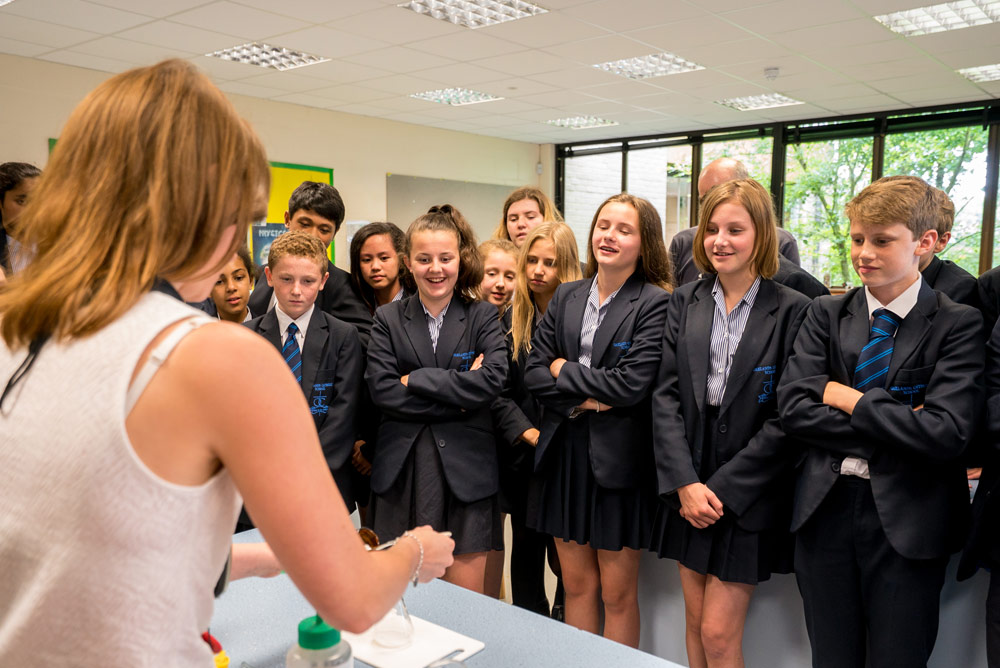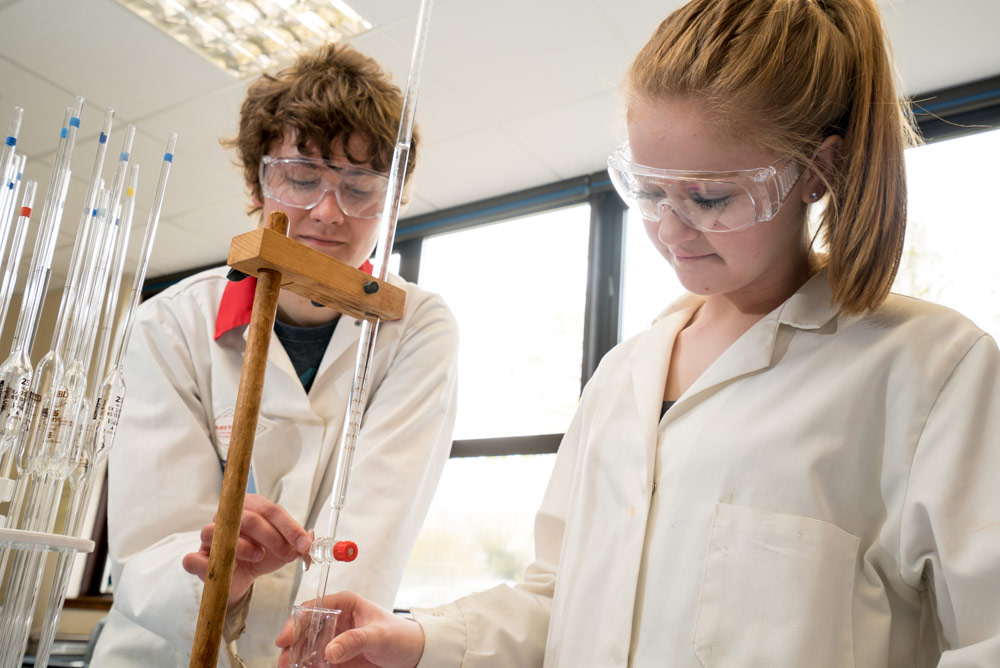Department: Science
Head of Department: Mrs C Gorman
If you wish to learn more about the curriculum, please contact the Head of Department by email: c.gorman@oaklandscatholicschool.org

If you wish to learn more about the curriculum, please contact the Head of Department by email: c.gorman@oaklandscatholicschool.org

The Science curriculum is built upon the foundations of Cognitive Science: the study of thought, learning and mental organisation. Wherever possible, what is known about the most effective strategies for learning has been incorporated into the implementation of the curriculum. This is constantly reviewed and evolves as key developments in educational research are monitored and incorporated.
We work closely with our key feeder primary schools to understand which areas have been mastered at KS2 so when topics are revisited through the key stages the priority it is to build upon and consolidate prior learning, ensuring any ‘gaps’ in knowledge are quickly addressed this ensure that the National Curriculum and more is covered.
The curriculum is structured so that topics are taught in a logical sequence in which knowledge and understanding build coherently. Relevant knowledge from previous topics is revisited and linked to new learning. The strategies of retrieval practice, spaced retrieval and interleaving, which have all been shown to improve learning, are embedded across the department. Similarly, specific tasks to improve disciplinary literacy, recently highlighted as a key barrier to learning, are routinely used.
A variety of teaching strategies are used in Science and teachers use their professional judgement to select the most appropriate approach for a given topic and class.
Key Stage 3
Students begin Year 7 with an extensive unit that develops their core knowledge and skills. Aspects of Science studied include safety, using key equipment, taking measurements and writing scientifically. These key skills and knowledge form the foundation of their learning and are revisited frequently during key stage 3 and key stage 4.
Students then progress to units on important aspects of Science, such as The Particle Model and Cells, which give them a broad foundation of understanding and prepares them for GCSE Science.
Key Stage 4
Students follow either Triple Science (leading to separate GCSEs in Biology, Chemistry and Physics) or Combined Science (leading to a double award, equivalent to two GCSEs). Regardless of the pathway followed, all three Science disciplines are studied equally.
Students build on what they have learnt in key stage 3, developing a deeper and broader subject knowledge. The importance of experimentation in Science is reflected in the emphasis given to the development of investigation skills.
Regular assessment is used to identify misconceptions and areas of weakness, allowing the curriculum to be remodelled to best support the needs of learners.
Key Stage 5
Students have the opportunity to study Biology, Chemistry and Physics at A-Level. Teachers use their knowledge of GCSE Science to support learners in making the step up to the higher demands of A-Level study.
The experience of Science in the 6th Form is enriched by numerous extra-curricular activities. Students are encouraged to complete their own research projects, and this has lead to numerous students achieving Gold and Silver CREST awards in recent years. Visits to local universities are common, for example to carry out practical work in the undergraduate laboratories or to attend outreach lectures. Students have also supported the learning of younger students, for example by working with key stage 2 students from a local Junior School.
Science has a broad curriculum spread over the three key subject areas of Biology, Chemistry and Physics. All of these subjects cover the many ways that Science has helped humanity through innovation and technology impacting directly on the human race or helping to protect the planet on which we live. They encourage students to ask questions, provide ideas and then investigate to provide answers and solve problems along the way. In addition, the topics foster an interest in science beyond our planet and to the solar system and universe beyond and encourage students to think about the ethics behind innovation and the impact it can have in relation to catholic social teaching morals. The themes below are dealt with across all key stages for each subject and during extra-curricular activities.
To increase a student’s understanding of Catholic Social Teaching
The very nature of Science encourages students to challenge, analyse and evaluate current ways of thinking or theories. Students are encouraged to make decisions for themselves and to have the courage to follow their own convictions. This is fostered through STEM clubs and curriculum days where students can work on individual or small team projects with support from Science teachers. When engaging in CREST awards, students must think about how their project relates to the common good and improve lives in society around us. All lessons encourage open discussion so that even an incorrect answer to a question might open up a line of enquiry that could solve a different problem.
A fundamental aspect of effective teaching and learning is providing high quality feedback that supports learners progress. In Science, this happens in a variety of ways and learners’ receive extensive feedback frequently. This is often whole class feedback, an efficient and effective strategy where a common problem or misconception is addressed with the whole class.
Students are assessed each half term by completing tests that target the most important skills and knowledge. These tests are written within the department and form a key part of the curriculum, as careful analysis of performance is used to adjust future teaching and learning. This analysis of performance identifies gaps in knowledge as well as strengths and weaknesses in specific question types, such as recall, literacy and understanding, the results of which are carefully analysed to provide each student with a breakdown of their progress. A key feature of our feedback policy is to address learning needs identified in these tests during ‘follow-up’ lessons. In this way, teacher feedback is focused and leads to real improvement.
Extra Curricular and Cultural Capital
During our delivery of the curriculum, teachers will regularly link knowledge and skills to current world events, to important scientific breakthroughs and to future plans. This provides an opportunity to place knowledge and skill within and intellectual moral and social field. This will sometimes provide a vehicle to explore how the study of Science and other subjects can link to future careers. This in turn makes Science more relevant and engaging for students whilst enriching their cultural capital.
Enrichment activities, that are available to all students, often provide tangible links between the knowledge developed in science and practical applications. An extensive range of extra-curricular activities are offered within the department. These include visits (such as to the ‘Big Bang Fair’ and Clanfield Observatory), competitions (such as the Royal Society of Chemistry’s ‘Top of the bench’) and clubs. Many students attend lunchtime and after school clubs in which they extend their knowledge and experience of Science, often achieving CREST awards.

Development of Literacy through Science
The language of Science is challenging, with the use of uncommon, technical vocabulary commonplace. Literacy skills are specifically and frequently targeted to boost students’ confidence when communicating in the subject.
Science department strategies include:
Disciplinary literacy
Giving students the ability to read complex academic texts
Targeted vocabulary instruction